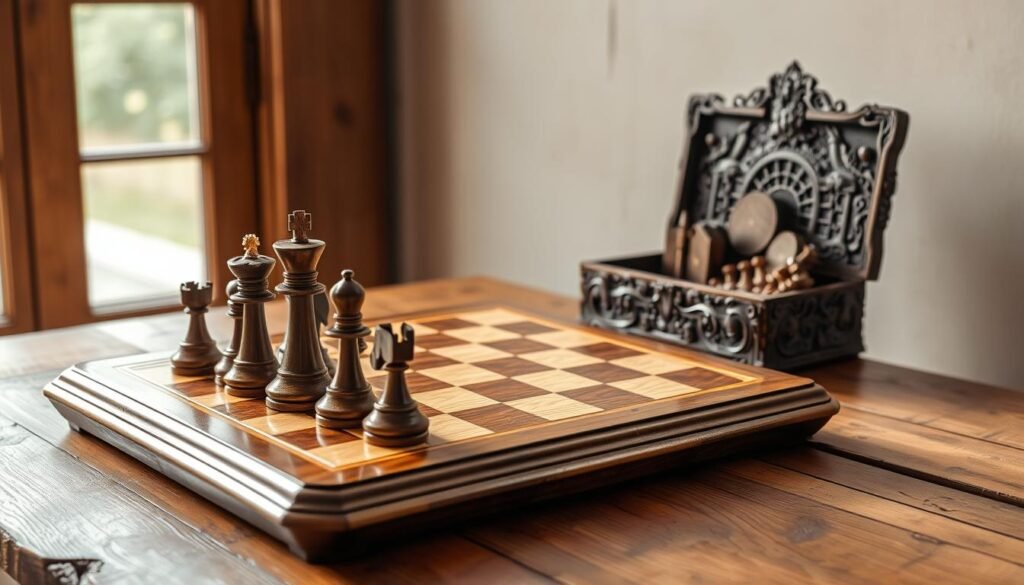A study at Albert Einstein College of Medicine in New York City found something amazing. People who play chess are 55% less likely to get Alzheimer’s disease than those who don’t1. This shows how chess can help keep the mind sharp as we age.
Playing chess boosts memory and thinking skills, says the American Psychological Association1. It also helps lower anxiety and depression in older adults. Plus, it’s a great way to meet new people, which is good for our mental health1.
By playing chess, we can keep our minds active and healthy. It’s a game that helps us stay sharp and mentally fit as we get older.
Key Takeaways
- Playing chess can reduce the risk of Alzheimer’s disease by 55% compared to those who don’t play.
- Chess improves cognitive function, memory, and analytical skills while decreasing anxiety and depression in aging adults.
- Chess provides opportunities for social engagement, which is crucial for the mental well-being of older adults.
- Individuals with Alzheimer’s disease who played chess experienced a delay in cognitive decline of up to six months.
- Chess has been linked to increased mental stimulation and enhanced cognitive abilities in aging individuals.
Cognitive Benefits of Playing Chess for Older Adults
Playing chess can greatly benefit older adults’ minds. A study by the Journal of the American Medical Association found a 9% lower dementia risk in chess players. This is because chess boosts critical thinking, logical reasoning, and social skills2.
It also enhances memory, spatial skills, and focus. These are key areas for the brain2.
Improved Memory and Concentration
Playing chess regularly can improve memory and focus. A study on elderly people with Mild Cognitive Impairment showed Mahjong improved their brain function. This suggests chess can also have a positive effect2.
Playing cards or Mahjong can also lower dementia risk in older Chinese adults. This was found in a long-term study2.
Delayed Cognitive Decline and Reduced Dementia Risk
Adding chess to your life can slow down cognitive decline and lower dementia risk. A review on mild cognitive impairment treatment found chess and other games can improve brain function in seniors2.
An 18-year study found that doing leisure activities can significantly lower dementia risk. This shows the importance of keeping the mind active2.
Chess can keep the mind sharp and delay age-related cognitive decline. Outdoor chess board tables and regular play can offer these benefits to seniors2.
“Engaging in leisure activities, such as playing cards or Mahjong, was associated with a reduced risk of incident dementia in Chinese older adults.”
Benefits of Playing Chess in aging
Playing chess can help older adults in many ways3. It challenges the mind, improving memory and problem-solving skills3. Chess also helps players think ahead and make strategic decisions3.
Playing chess with friends or at community centers is great for social interaction3. This interaction is key for mental health and well-being in older adults3.
Studies show that playing chess can lower dementia risk4. A study with 10,318 participants aged 73.8 on average found a 9% lower dementia risk4. Creative pursuits and passive tasks also showed benefits, but chess was more effective4.
Using computers and adult literacy activities were even more beneficial, reducing dementia risk by 11%4.
Chess is great for older adults because it challenges the mind and encourages social interaction3. The World Health Organization notes that the number of people aged 60 and above will double by 20503. Chess is a good way to keep the mind sharp and connect with others3.

Chess offers more than just cognitive benefits4. The Chess for Seniors nonprofit has taught over 200 older adults to play chess4. This helps reduce stress and increase focus, improving overall well-being3.
In conclusion, chess is more than just a game for older adults3. It enhances cognitive function, promotes social interaction, and reduces stress3. As the population ages, chess is a valuable activity to maintain mental health and well-being3.
Conclusion
Research shows that playing chess helps older adults a lot. It improves their memory5 and focus5. It also slows down brain decline and lowers dementia risk6.
Chess makes the brain work hard. It needs players to think deeply and plan ahead. This helps keep the brain sharp as we get older5.
Even though more research is needed, chess is still very helpful. It keeps the mind sharp and can even slow down serious brain problems6. As more people get older, playing chess will become even more important for keeping their minds healthy5.
Chess is great for people of all ages. It keeps the mind active and helps people connect with others6. It can even bring together different generations, helping them learn from each other6.
By playing chess, older adults can keep their minds sharp. This helps them stay well and happy as they get older.
FAQ
What are the cognitive benefits of playing chess for older adults?
Can playing chess help reduce the risk of dementia?
How can playing chess benefit the mental health and well-being of older adults?
Source Links
- What Benefits Does Playing Chess Have For Seniors? – https://www.discoveryvillages.com/senior-living-blog/what-benefits-does-playing-chess-have-for-seniors/
- The effect of the leisure activities based on chess and cards for improving cognition of older adults: study protocol for a cluster randomized controlled trial – https://www.ncbi.nlm.nih.gov/pmc/articles/PMC10386780/
- Chess Practice as a Protective Factor in Dementia – https://www.ncbi.nlm.nih.gov/pmc/articles/PMC6617066/
- Why Playing Chess Reduces Risk Of Dementia – https://www.chess.com/blog/raync910/playing-chess-reduces-dementia-risk
- 11 Proven Benefits Of Playing Chess | Battle Of Chess – https://battleofchess.com/benefits-of-playing-chess/
- Chess: The Timeless Game for Seniors and Young Ones — Elegant Care Villa – https://elegantcarevilla.org/careblog/chess-the-timeless-game-for-seniors-and-young-ones
